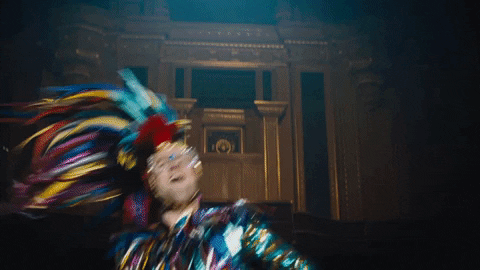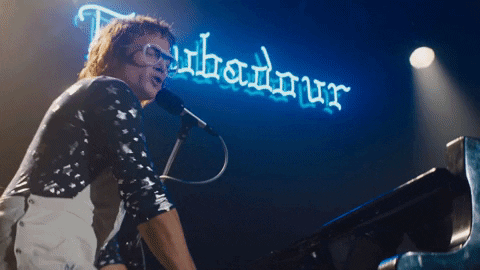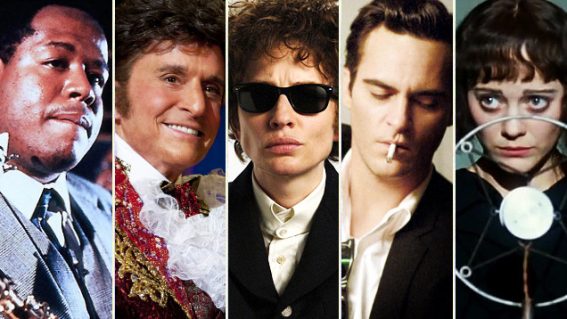Rocketman is a fabulous, glitter glue-bound musical biopic

Littered with narrative and stylistic innovations, the Elton John musical biopic Rocketman never takes the audience’s attention for granted. It is bold, personal and fabulously entertaining, says Luke Buckmaster.
I was fond of the scene in Rocketman inspired by the legendary Troubadour concert, in which Elton John (Taron Egerton) teases a rendition of Crocodile Rock – starting slow and drawing out his lines, before applying an amphetamine pep to his step and cranking the dial to 11 and bringing the house down. Then, when this moment explodes into magical realism, the gravity-defying performer pulled into the air like a marionette and the audience rising from the ground, as if the energy in the room were so jubilant it could counter the laws of reality and move people like magnets towards the heavens, I started loving it.
The scene reflects a lot about the way director Dexter Fletcher approaches core challenges of the biopic. He operates with an implicit understanding that recreating the past is impossible, and attempts to do so are always fraudulent – because the rhythms of reality are very different from the rhythms required for interesting drama. What films can do however is capture the spirit of a moment, in a similar way that poetry can evoke a kind of truthfulness that transcends factual statements.
We see evidence of that throughout the very fabulous and very entertaining Rocketman. The scene that incorporates a rendition of the titular track, for instance, begins with terrible sadness – Elton gulping down a handful of pills and jumping into a swimming pool, performing a half-arsed suicide attempt – and ends with the surreal sight of the man blasting into space. In between these bookend visions is a magical dance; a to-and-fro between reality and fantasy, involving ambos attempting to put an oxygen mask on John, and John removing the mask in order to sing. A tug of war between the contraption that saves your body and the artistic process that expresses your soul.

Rocketman’s framing device is an alcoholics anonymous style meeting in which John arrives, in ludicrous orange birdman garb, and admits to the group his various vices – including being an alcoholic, a drug and sex addict, and having anger management issues. Fletcher segues to his youth, not before paring back the film’s colour scheme and positioning two versions of the protagonist – the other his childhood self – in the same scene, literalising his past. It is the first but far from the only example of a film that treats narrative segues as unique entertainment propositions, merging time and space with fussy panache, rendering the past as a kind of phantasmagoric pageant or glitter glue-bound history lesson.
Comparisons are inevitable to the monstrously successful Bohemian Rhapsody, to which Fletcher contributed (as the ring-in director after Bryan Singer was fired). That film is a trashy play-to-the-backrows spectacle told with a loud kind of gutlessness. It pushed Freddie Mercury’s homosexuality into the closet, as if it were something to be ashamed of. Not unlike the Queen performer himself, it preferred party-themed ballyhoo – foot stomping, clapping, we will rock you etcetera – over personal statements, of which Elton John has made many.
That is not to say one form is necessarily better than the other, though it’s hardly a surprise to see the tone of the artist influencing the tone of the text. Rocketman is much more intimate, and risky in ways that might have come across as laughably bad had the director buggered it. Sometimes, for instance, during key dramatic moments the actors break out into song – a bold move that uses music to distort drama in the best kind of way. Among the film’s most interesting suggestions is the idea that John’s extravagant costumes are a way of trying to escape his roots. One interaction with his father Stanley (Steven Mackintosh), with whom John had a strained relationship, has a particularly aching quality. They are in each other’s company, being cordial in a lounge room, but it’s clear there is 100,000 miles between them and the distance will never be mitigated.
I didn’t buy the maniacal representation of John Reid, the superstar’s ex-manager and lover (played by Richard Madden). His ghastliness feels too cartoonish – too much like a Bond villain – and a little like score-settling: as if this came about because John chose to deliver a final blow to an old nemesis. He and his husband David Furnish were producers of Rocketman, and a cursory search unsurprisingly reveals bad blood between the musician and Reid. Revenge via representation in popular culture might be justified or it might not, but either way the film suffers – not much, but a little bit. Retribution is rarely a good look and it plays a part in reducing Rocketman’s scope as a celebration; it clangs on the palette.
The very square-jawed Taron Egerton, who played Eggsy in the Kingsman movies and sports a facial bone structure so chiselled and precise you could set your watch to it, is wisely cautious about camping it up, understanding the aforementioned point – that John’s predilection for extravagant garb is not simply a ‘natural’ extension of his character. It goes deeper than that. And yet it’s not complicated: his colourful get-ups are to be cherished not because they are necessary, but because they aren’t. You could say the same about this film, too, and you could even say the same about art itself. Nothing about this wonderfully entertaining biopic is necessary, but most things about it are fabulous.


















